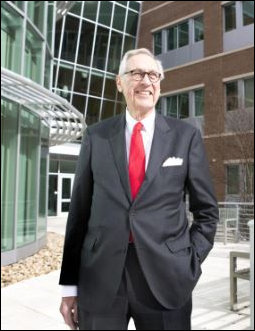
Heywood Fralin, his wife Cynthia, and the Horace Fralin Charitable Trust have announced a $50 million gift to Virginia Tech to attract top-ranked scientists to the university’s Roanoke medical research center. The gift is twice the size of the university’s previous single largest donation.
“I came up with the size based on what I felt I could do. I wanted to make a maximum gift that was a challenge to me and to the trust because I thought it was important to the community. And I thought it could benefit everyone, and it would have a lasting impact that would help to change the future of the Roanoke Valley and the surrounding area,” Fralin said in a Wednesday interview with the Roanoke Times.
“I’ve told governors this. I’ve told legislators this: I don’t think there is an economic development project in Virginia that will be more successful than this one,” he said. “That’s a large statement. I hope I don’t have to take it back.”
Virginia Tech is partnering with Carilion Clinic, western Virginia’s dominant health provider, to build a medical school and research center in Roanoke. The med-ed complex has been a major source of growth for the local economy, which has been battered in recent years by the departure of Norfolk Southern railroad operations and the loss of other major employers. Fralin’s gift will make the center more competitive in the recruitment of top research talent.
Fralin, who is chairman of Medical Facilities of America, a regional provider of nursing and rehabilitative care, has made Virginia higher education his mission in life. As chairman of the State Council of Higher Education for Virginia (SCHEV), he has been an outspoken supporter of Virginia higher ed community, and he has worked to position SCHEV as an institutional advocate for the states’ public colleges and universities.
As a taxpayer, I have major misgivings about Fralin’s take on higher-ed. Judging by his comments at SCHEV meetings, Fralin blames the middle-class college affordability crisis almost entirely on state funding cutbacks. I never heard him criticize higher-ed institutions for their runaway costs. But I have to respect him for making this massive donation. He’s not asking others to do something he’s not willing to do himself. He is truly putting his money where his mouth is. He deserves the thanks of all Virginians for his generosity.
As an aside, I have to say that Virginia Tech is on a roll. Under the leadership of President Timothy Sands, Tech has done an outstanding job of expanding its academic research empire. Last year the university persuaded the General Assembly to fund CyberX, a $65 million cyber-security program, in which Tech will be the dominant player. Last month Sands announced plans to build a $1 billion Northern Virginia technology campus near the new Amazon, Inc., mega-facility. Now Fralin is donating $50 million to build the Roanoke medical research complex. And those are just the big-ticket items.
Tech has accomplished more in recent years than Virginia’s other major research universities — the University of Virginia, Virginia Commonwealth University, and George Mason University — put together. Furthermore, Tech has expanded its research horizons while doing a better job than its peers of moderating the inexorable increase in tuition, fees and other costs of attendance. As critical as I often am of Virginia’s higher-ed establishment, I have to give credit where credit is due.

Leave a Reply
You must be logged in to post a comment.